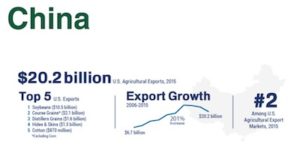US/China Farm Wars [NCPA Debate Central post]
Bagoly mondja verébnek, hogy nagyfejű.
(English version: “Pot calling the kettle black.”
Many other cultures here. )
In “United States Challenges Excessive Chinese Support for Rice, Wheat, and Corn” (September, 2016), the Office of USTR announced:
Today, the Obama Administration has launched a new trade enforcement action against the People’s Republic of China at the World Trade Organization (WTO) concerning excessive government support provided for Chinese production of rice, wheat, and corn. [Admin. officials joined] by bipartisan members of Congress in announcing the complaint which challenges China’s use of “market price support” for three key crops (rice, wheat, and corn) in excess of China’s commitments under WTO rules.
However, the U.S. government also subsidizes farmers growing and exporting rice, wheat, and corn. Comparing farm subsidies across countries is complex. Iowa plays a key role in each Presidential election cycle because of the early caucuses are ahead other state primaries. And because corn is big business in Iowa, Presidential candidates in Iowa campaign stops call for maintaining corn and ethanol subsidies.
…
According to an “Agricultural Subsidies” (October 7, 2016 ) on Downsizing Government, the U.S. Department of Agriculture (USDA) spends an average of $25 billion a year on eight major farm subsidy programs. Yearly costs vary depending on farm prices and policies.
Reasons to end US farm subsidies are listed and discussed in the article, and number 4 should be of particular interest to students debating US/China policy reform:
1. Subsidies Redistribute Wealth Upwards.
2. Subsidies Damage the Economy.
3. Subsidies Are Prone to Scandal.
4. Subsidies Undermine U.S. Trade Relations.
5. Subsidies Harm the Environment.
6. Agriculture Would Thrive without Subsidies.
Crop prices fell in 2016 and Reuters reports “USDA to pay farmers more than  $7 billion due to low crop prices,” (October 4, 2016). Though USDA and farm groups argue the federal insurance subsidies help provide just a “safety net” for farmers when prices fall, they encourage farmers to expand production, since they can expect to make money whether prices at harvest time are high or low (selling at market prices or at government-subsidized insured prices).
$7 billion due to low crop prices,” (October 4, 2016). Though USDA and farm groups argue the federal insurance subsidies help provide just a “safety net” for farmers when prices fall, they encourage farmers to expand production, since they can expect to make money whether prices at harvest time are high or low (selling at market prices or at government-subsidized insured prices).
